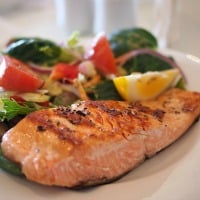Previous research has indicated that since fish tends to be associated with mercury and other pollutants, having it during pregnancy can be dangerous to the growing baby, given that these neurotoxic substances can reach and spread throughout the amniotic liquid. However, recent research, carried out in Spain, and published in the American Journal of Epidemiology, has shown that exposure to seafood consumption during pregnancy is far from detrimental to fetal development. In fact, it can result in increased IQ, by boosting and accelerating the cognitive process.
Professionals from Barcelona’s Center for Research in Environmental Epidemiology looked into the information gathered during the Spanish Childhood and Environment Project, which studied approximately 2,000 women starting from their earliest stages of pregnancy, from 2004 until 2008.
During the study, each of the participants answered various questions, more particularly regarding their daily eating habits. Researchers were able to assess each individual’s weekly intake of shellfish, lean fish (sole, sake etc.) and fatty fish like salmon, mackerel, swordfish, sardines, albacore tuna, anchovies etc.) Researchers also evaluated the respondents’ blood test results, focusing mostly on iodine and vitamin D levels, and consistently monitored baby’s vulnerability to mercury and other pollutants by studying data from umbilical cord blood tests.
This extensive information was then compared with the results acquired by the babies in their first 5 years of life, during numerous cognitive examinations.
The researchers found for pregnant mothers who had consumed approximately 17.6 ounces of fish on a weekly basis, their offspring acquired progressively higher scores during the IQ assessments. Moreover, the consumption of large fatty fish during pregnancy presents moderate child neuropsychological benefits, including improvements in cognitive functioning and some protection from autism-spectrum traits.
Other advantages remained obvious for all the kids that had been exposed to fish while in the womb, as long as weekly servings preferred by their mothers didn’t extend beyond 21 ounces.
It is suggested that pregnant women eat moderate amounts of fish, especially in the first trimester of pregnancy, a stage that is more beneficial for the fetus. However, they should be prudent and avoid eating swordfish, catfish, king mackerel or shark, as these species absorb more mercury and other pollutants than other marine creatures, due to their long life cycles. Furthermore, it is a well-documented fact that fatty fish in particular contain a large number of brain-boosting nutrients, such as essential types of omega-3 fatty acids—EPA (eicosapentaenoic acid and DHA (docosahexaenoic acid).
These two compounds, found in salmon, herring, sardines, mackerel, kipper, trout etc., have been confirmed effective in developing the main component of brain cell membranes, and also preventing brain degeneration as is associated with Alzheimer’s disease.




